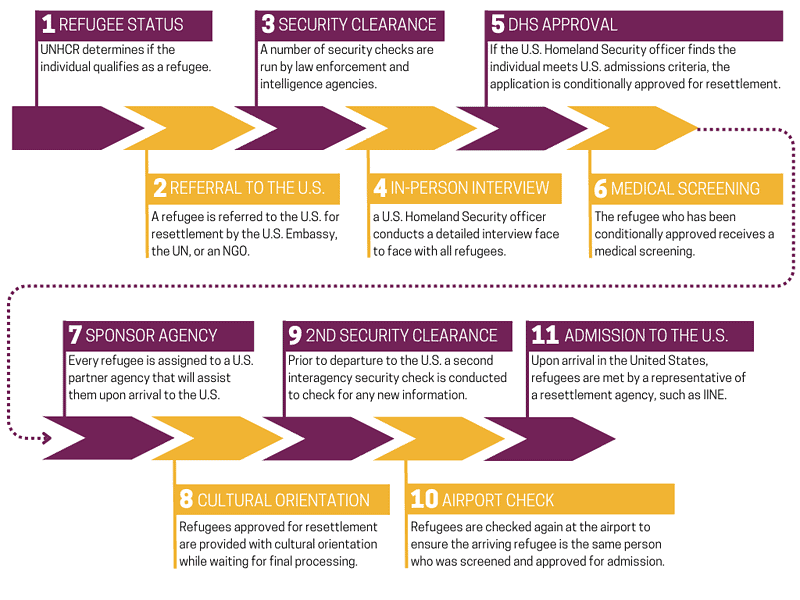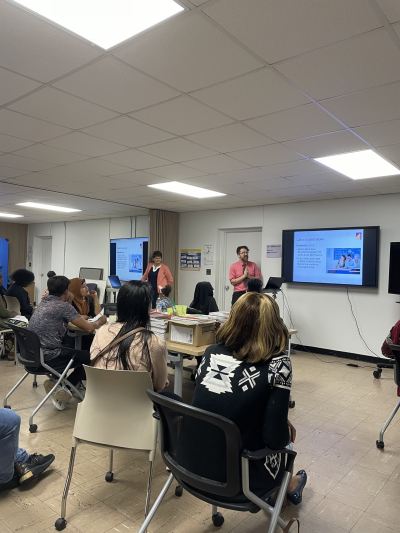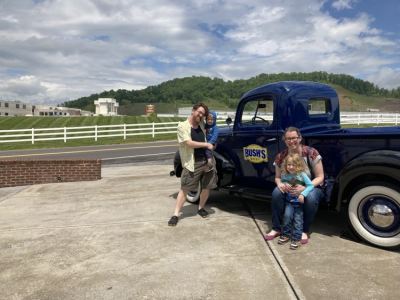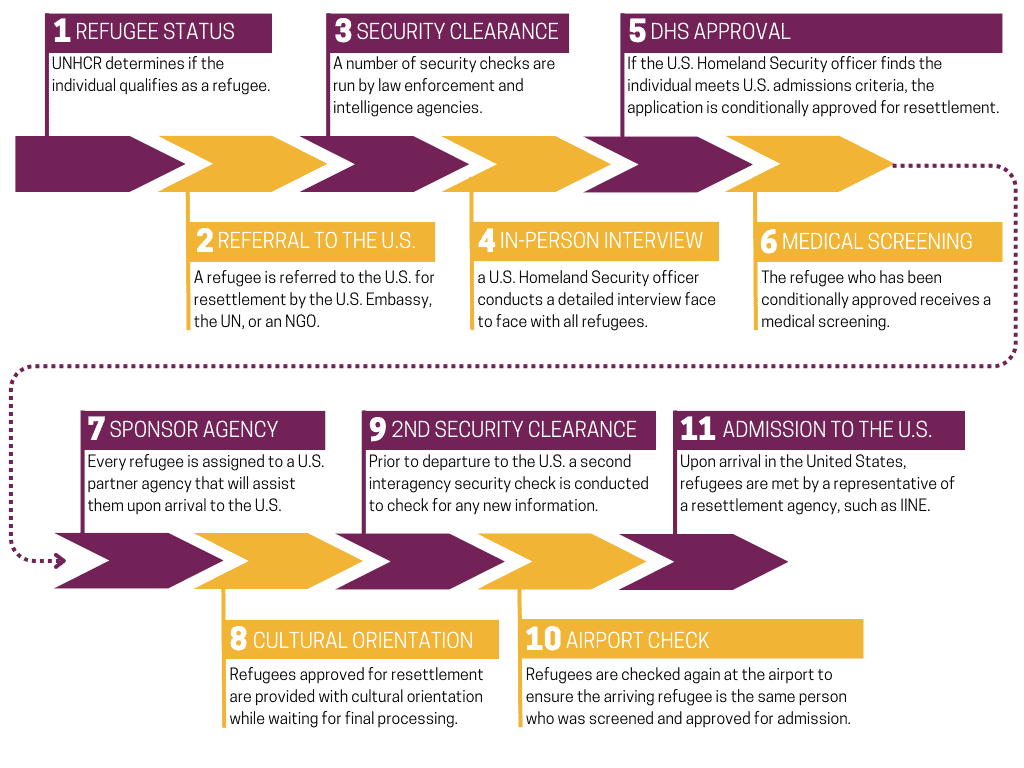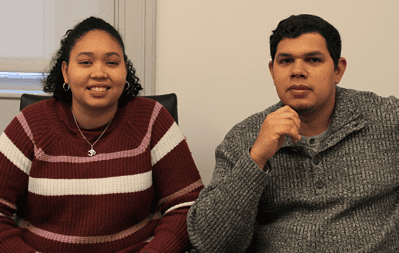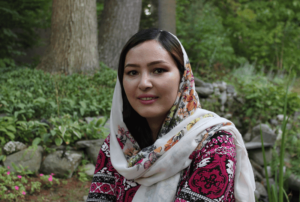Celebrating Our Staff’s Work Anniversaries
We caught up with a handful of staff celebrating work anniversaries to hear what initially brought them to the International Institute of New England, how their roles and the organization have evolved since then, and what they enjoy most about the work today.
Emma Pond, Career Navigator
Celebrated her 1-year work anniversary in 2023
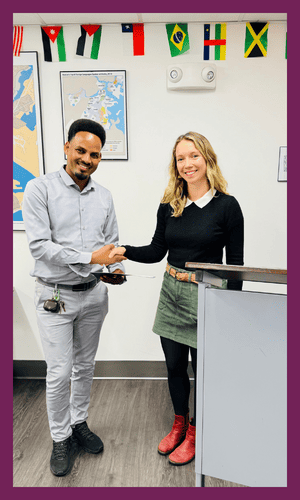
What first inspired you to join IINE?
Before working at IINE I worked for the International Rescue Committee in New York. I had just spent a year working in the city and three months working at Lifting Hands International in Greece. I knew I wanted to keep working in resettlement, and soon found IINE. I was impressed by the history of IINE and the work IINE does in New England. I was so excited when I got an interview for a Career Navigator position!
One year later, how have your role and IINE changed?
My role has changed over the course of my first year here. I started as a Teaching Assistant to the Career Navigator running the MassHire program, Ready, Set, Service! (RSS). Soon after, I started working with the clients directly to find jobs and recruit for the next cohort. I have now taught two cohorts of RSS and six Driver’s Ed courses. The most recent RSS class graduated on 11/17/23 and now I start the next chapter of finding job placements.
What do you enjoy most about your role today?
My favorite part of my job is teaching. I love connecting with the students and feeling like I am contributing something useful. When students in my class form friendships and support each other, that makes me even happier. Driver’s Ed, which I started teaching in May of this year, has been a surprisingly fun and rewarding part of my job as well. Driver’s Ed is only four days but in those four days, students learn what they need to know to pass the Permit Exam. It is extremely rewarding to see students take the class, pass their exam, and then write to me that they have passed their driving test and are now licensed. Having a license opens the door to so much; being a small part of that newfound agency is very special.
Yusuf Abdi, Manager, Career Services
Celebrating his 10-year work anniversary in 2024
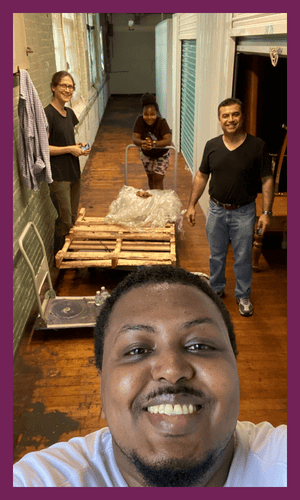
What first inspired you to join IINE?
America is a nation of immigrants that, at its core, embraces newcomers and gives them the opportunity to rebuild their lives. IINE supports this work by welcoming refugees and people who have been forced to leave their homelands. As a refugee myself, I wanted to be part of this work.
I joined the Career Services Team because finding employment is a fundamental step for immigrants to become self-reliant and independent. Jobs are key to paying rent, owning a car, and living in their new communities with dignity.
The opportunity to support refugees and immigrants inspires me daily in my role. For everyone who works at IINE, it is more than just a job – we are all working together to achieve the goal of helping newcomers to our country.
Nearly ten years later, how have your role and IINE changed?
When I joined the Lowell office as an Employment Specialist, we were a team of two. When the administration changed in 2016, our team decreased to just me. It was a very difficult moment in time. Since then, thankfully, we have grown a lot – and we had to, to support the large influx of Afghan immigrants [in 2021]. Today, we are a team of seven.
I have moved up from a Specialist, to a Lead, to now the Manager of the team. Throughout my time at IINE, I have learned so much, and I am grateful to have been provided with many training opportunities.
What do you enjoy most about your role today?
Seeing our clients start with nothing, in many cases, and become self-sufficient – that always motivates me. Over the years, I have watched newly arrived clients, who I helped find jobs, go on to buy cars, enroll their children in school, and then their children graduate and go on to university. It is amazing to see this growth. And our clients are so appreciative. That’s what keeps me doing this work.
I also enjoy building bridges between our clients and local employer partners. Not only do I get to help our clients, I get to help the local economy, and employers thank us for supporting their businesses. For instance, during the pandemic, many healthcare providers needed staffing quickly. They reached out to me, and we were able to play a tremendous role in connecting them with our clients and fulfilling their needs in a short time.
Lastly, I really enjoy the community that exists at IINE. Everyone that first comes to us is experiencing a transition period. They aren’t yet self-sufficient and they need temporary support. Our clients understand this, and as they become more self-sufficient, they help others. So our Congolese clients have gone on to help our Afghan clients, and now our Afghan clients are helping our Haitian clients. They are driving them to appointments, welcoming them to the neighborhood – there is trust between them, even though they all come from very different backgrounds, because they share a connection through IINE. Seeing that willingness to give back, it’s very meaningful. We are a family here.
Pam Seremet, Education Program Specialist
Celebrated her 3-year work anniversary in 2023
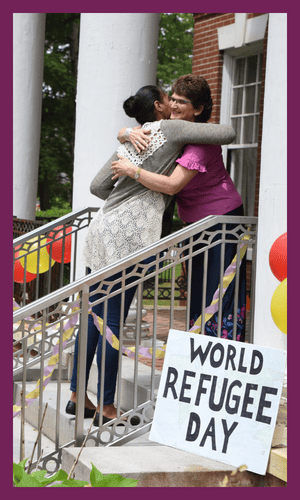
What first inspired you to join IINE?
In 2013, I went back to school to get my master’s because we had an international program at a private school I was teaching at and I thought it would be good to study ESOL (English for Speakers of Other Languages) to help out with that program. In 2016, I received my master’s in education with a concentration in ESOL. I was planning on “retiring” from elementary school and moving upstairs to be the high school ESOL support. However, in 2018, the school closed. So… I was looking for a place that I could use my ESOL skills to help students succeed. When I read the mission statement of IINE, I knew it was a place I wanted to be a part of.
Three years later, how have your role and IINE changed?
I was hired in October of 2020, in the midst of COVID. We had four classes and I taught two of them. Three of the classes were on Zoom, and I had six Literacy students in person that I had to teach how to use Zoom on their phones so the Literacy/Beginner class could still meet via Zoom. By January, we were all on Zoom. Then I split the Literacy and Beginners groups because of the big gap between the two groups. Today, we have seven ESOL classes, two classes for Healthcare, and an LNA (Licensed Nursing Assistant) class. We also have more teachers and support staff on the Education team since when I started. We have expanded from our office on Pine Street to Brookside Church and St. Raphael’s School to accommodate the bigger classes and yet we still have a long waiting list of adults who want to learn English!
The other piece of my job is curriculum. I have been in the process of writing curriculum for our three ESOL levels so that if a student enters our program in Level 1, they can flow continuously through the three levels and have a solid foundation of phonics, reading, grammar, writing, speaking and listening when they graduate from our program. I review curriculum to pick the best options for our students. Since there is no ONE curriculum that covers it all, I am always looking for outside resources to supplement and enhance the curriculum.
What do you enjoy most about your role today?
I love my job at IINE! I love helping my students improve in the many facets of English! I feel satisfied when they meet one of their goals and celebrate with them. When I see students struggling, I try to implement opportunities to practice those skills and encourage them to continue moving forward. I enjoy collaborating with the others on the Education Team. We share thoughts and ideas, build on each other’s suggestions, and divide and conquer duties when needed! I’m so grateful for my job and the people I work with at IINE!
CJ Mbaike, Budget Analyst
Celebrated his 1-year work anniversary in 2023
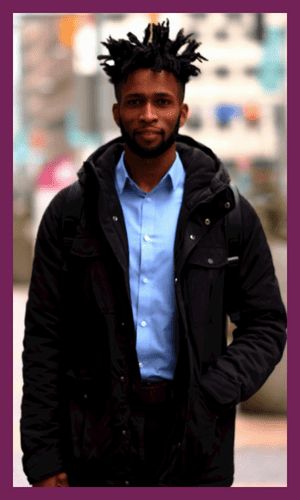
What first inspired you to join IINE?
The first thing that inspired me to join IINE is the mission. Being an immigrant from Nigeria, I know how difficult it can be settling in a new country where you may not have family or relatives and need to adjust to cultural differences. Wanting to help others like me is what inspired me to work for an organization like IINE.
Three years later, how have your role and IINE changed?
My role has transformed significantly: from self-growth to team and company growth, I have transitioned into an integral part of the Finance Team and being a team player to support IINE’s mission.
What do you enjoy most about your role today?
What I enjoy the most about my role is preparing a budget and being awarded a grant. For example, when I prepare a budget for the Advancement Team and I receive an email saying we were awarded the grant, it feels amazing and very rewarding.
Kate Bertino, Managing Attorney
Celebrated her 3-year work anniversary in 2023
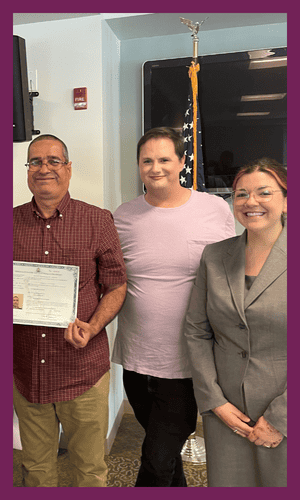
What first inspired you to join IINE?
I was inspired by the mission and determined to continue working in an area of law where I could be of greatest service to those in my community.
Three years later, how have your role and IINE changed?
When I first started at IINE as an Associate Attorney, the Immigration Legal Services Department was a team of three. Since then, I have been promoted to Managing Attorney and oversee three people out of a team of nine. It’s been exciting watching our program grow and continue to provide quality legal services.
What do you enjoy most about your role today?
I enjoy being a mentor for my staff and working with a team of dedicated and passionate professionals.
Interested in joining our team? Our collaborative, team-oriented environment offers opportunities to serve refugees and immigrants, while learning from other staff and departments. View career opportunities here.






 I was born and raised in southern Maine. I earned a Bachelor of Arts in Zoology and a Master of Education from the University of Maine, and then an M.B.A. from the Tuck School at Dartmouth College. Shortly after, in 1982, I moved to Boston, and I have been here ever since! My husband and I raised our three children on Beacon Hill. We have a long history with the city and feel lucky to call it home.
I was born and raised in southern Maine. I earned a Bachelor of Arts in Zoology and a Master of Education from the University of Maine, and then an M.B.A. from the Tuck School at Dartmouth College. Shortly after, in 1982, I moved to Boston, and I have been here ever since! My husband and I raised our three children on Beacon Hill. We have a long history with the city and feel lucky to call it home. 

